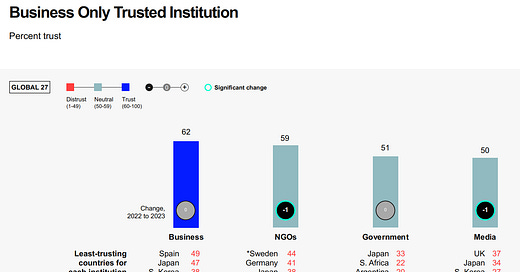Edelman, the global PR firm, released its 2023 Trust Barometer last week. The whole report is worth a flip through, but the “so what” from Edelman boils down to:
People trust businesses more than government, media, or NGOs
Polarization threatens trust for every institution
Businesses should step up and champion discourse and sensible policies
The PR firm goes on to make a few recommendations for business leaders in 2023:
An accompanying piece on the firm’s website offers more tactical advice that continues in the same vein: broad and easily memorable in bullet points, yet decidedly frustrating.
They are sensible, straight-forward, and somewhat obvious points for any business leader (e.g. “engage your employees”). But that’s the frustrating part. Edelman goes to the length of surveying over 32,000 people across 28 countries to produce a 71-page report on trust. And this report deals with heady topics: the declining trust of institutions, increased polarization, information echo chambers, and economic anxiety. And then recommends rearranging the deck chairs while the ship sinks.
Okay, the above paragraph is a bit unfair. The audience of Edelman’s report is primarily business leaders. And individual business leaders cannot tackle all broad societal issues by themselves. So small actions make sense. They are concrete, memorable, and obtainable.
Yet, it is exactly this small focus that is so concerning. If the output of this effort boils down to a few talking points on the low hanging fruit for executives to focus on, who is capturing what stretching a little bit could look like? Where is the thought-leadership on what could be possible outside of a business leader’s immediate field of view?
Yes, how businesses engage in civil society is a weighty topic. The past few years (even before the pandemic) has seen more discussion on these topics. The increased acknowledgement of stakeholder capitalism by the American business community and the notion of the CEO politician are two examples.
However, these discussions accompany messaging that the government is failing and business needing to be the savior. This narrative is concerning and misleading. The answer to government shortcomings isn’t for businesses to fill the void. It is to fix the problems facing governmental effectiveness.1
Democratic governments protect the rights of citizens, provide services that cannot (or should not) be provided by the private sector, and establish the legal and societal framework for a thriving society. Businesses are subject to the constraints and guardrails established by governments. If people don’t trust their governments, businesses cannot fill these voids via substitution.
What business leaders can do is recognize the importance of a functioning and trusted government for their own success and work to bolster the role of the state and the functioning of democracy. It is easy to dismiss the government as slow-moving, ineffective, and a barrier to innovation or progress. Unfortunately, it is even easier to not respect the institution of government due to the actions and words of individual politicians. And there is a lot of truth to all of these concerns! But it is not solved by businesses filling a void or stepping up where governments fall short.
Edelman plays into this narrative, if not intentionally. Of course businesses should promote civil discourse and look to navigate partisanship. Business leaders can help improve policy outcomes and offer innovative ways to solve societal level problems (a pandemic, climate change).
And the even harder effort, the part that Edelman didn’t write, begins when business looks to engage government and citizens to improve trust in government. To acknowledge that good governance is not antithetical to strong business outcomes. That businesses championing the crucial role that government plays in society is business filling the void by lifting the institution of government up not by supplanting it.
The veracity and extent of “government weakness” as a concept is much too broad to go into here. For the purpose here, let’s leave it at a significant lack of trust and increased polarization.




